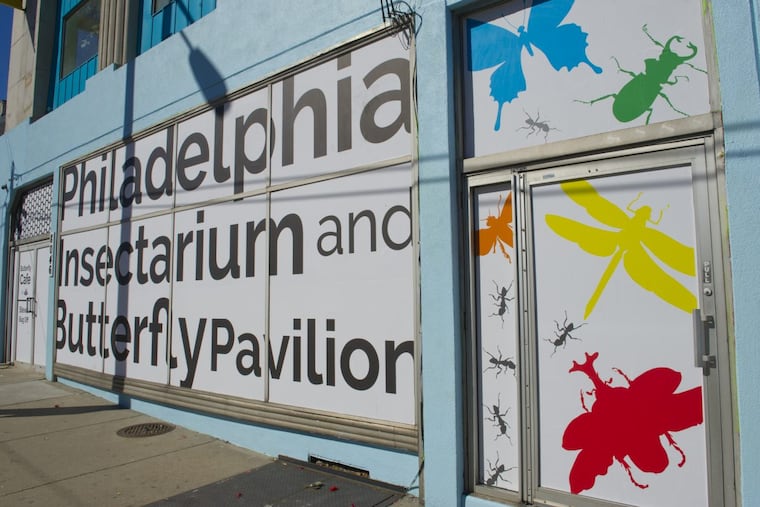Philadelphia Insectarium files for bankruptcy after being ordered to pay $928K in foreclosure judgment
On the day the judgment came down, the Insectarium filed for Chapter 11 bankruptcy.

There’s more trouble at the Philadelphia Insectarium and Butterfly Pavilion. And this time, it’s not a bug burglary.
Last week, a Philadelphia judge ordered a $928,000 foreclosure judgment against the long-running Northeast Philadelphia insect museum, bringing a conclusion to a years-long case. On the same day the judgment came down, the Insectarium filed for Chapter 11 bankruptcy.
The issue stretches back to 1989, according to the opinion from Philadelphia Court of Common Pleas Judge Vincent L. Johnson issued Wednesday. That year, Steve Kanya, the Insectarium’s founder, entered into a $350,000 mortgage agreement with the now-deceased Milton Rubin — whose estate is the plaintiff in the case — to purchase the Insectarium’s building at 8046 Frankford Ave.
In 2017, Rubin’s estate filed a foreclosure action against Kanya and the Insectarium. That trial played out last fall.
Kanya, who did not mount a defense during the foreclosure trial, had trouble making payments on the mortgage loan. After modifying the terms in a verbal agreement with Rubin, Kanya continued to struggle to pay, and defaulted, according to court documents. Though Kanya filed for Chapter 11 bankruptcy himself in Florida in 2010, Milton Rubin’s estate retained its lien on the property as part of an agreement.
Kanya also transferred the property at least twice: first to joint ownership with his wife, and later via quitclaim deed to the Insectarium and Butterfly Pavilion Inc. — run by Insectarium CEO John Cambridge.
A quitclaim deed is used to transfer the title of a property from one party to another, but provides little protection to the buyer.
Kanya testified that following the transfer in August 2016, the Cambridges and the Insectarium “more or less stole everything, everything, my life,” removing him from the property and destroying his records.
Cambridge’s father, Robert Cambridge, represented the Insectarium in court and serves as the organization’s secretary and director.
Steven Rubin, Milton Rubin’s son and estate executor, did not become aware of that transfer until 2017, according to the opinion. Kanya informed Steven Rubin that April that he had “been thrown out of the business and could no longer make the mortgage payments,” according to court documents. Kanya had not made payments on the debt since 2016.
At a trial before Johnson in November, John Cambridge admitted that his father “encumbered the property … with at least three additional mortgages” and that his father and mother later “sued the Insectarium and obtained a default judgement” for over $2 million, court documents said. Cambridge told the judge that while his parents “gave Insectarium large sums of money,” none of it was used to pay the mortgage debt, according to the opinion.
Johnson found that Milton Rubin’s estate is owed $927,851.08 — an amount for which the Insectarium is responsible before any other debts, the court found. At one point, the judge asked John Cambridge if he understood that “as a property owner of a quitclaim deed you’re responsible for all liens and judgments that are attached to the property.”
“I am so aware of that now it hurts,” John Cambridge replied, according to court documents.
The judge awarded Milton Rubin’s estate that amount, plus interest, costs, and attorney fees. The estate also won possession of the Insectarium property, which the court has ordered to go to sheriff’s sale to satisfy the money judgment.
On the day the decision was released, Robert Cambridge filed a petition for Chapter 11 bankruptcy for the Insectarium in federal bankruptcy court.
That is likely to delay the foreclosure. But Gary Lightman, the attorney for Rubin’s estate, said he plans to file a motion that could let the estate take possession sooner.
Robert Cambridge, the Insectarium’s attorney, said the Insectarium plans to “let things go forward and see what happens.”
“We’d like to see it keep going, so we’ll try,” he said. “One step at a time.”
» READ MORE: Bugs, education, and a $40,000 heist: The history of Philadelphia’s Insectarium is more bizarre than you think
This case is the latest development in the Insectarium saga. In 2018, an alleged burglary resulted in an estimated 7,000 insects, lizards, and other species going missing from the bug museum. John Cambridge estimated the value of the loss at about $40,000 at the time, and suspected that the creatures would be resold illegally. No one has been officially implicated in the crime.
Last year, IMDb TV premiered a docu-series about the heist called Bug Out. Directed by Lower Merion native and former attorney Ben Feldman, the series explores the bug theft, as well as the illegal underground insect market and the history of the Insectarium.
After the documentary’s release, John Cambridge filed a defamation lawsuit against Bug Out’s creators, alleging that it “includes numerous factual assertions that are not true.” That case remains ongoing.